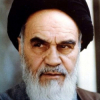Ruhollah Khomeini

Ruhollah Khomeini
Grand Ayatollah Sayyid Ruhollah Mūsavi Khomeini, 24 September 1902 – 3 June 1989), known in the Western world as Ayatollah Khomeini, was an Iranian Shia Muslim religious leader, revolutionary, politician, the founder of the Islamic Republic of Iran and the leader of the 1979 Iranian Revolution which saw the overthrow of the Pahlavi monarchy and Mohammad Reza Pahlavi, the Shah of Iran. Following the revolution, Khomeini became the country's Supreme Leader, a position created in the constitution of the Islamic Republic...
NationalityIranian
ProfessionStatesman
Date of Birth17 May 1900
Before the revolution I thought there are appropriate individuals who would do the job according to Islam, therefore I repeatedly said that clerics would go after their own job. Then I saw that most of them were inappropriate individuals and I found out that what I said was not true, so I came and clearly announced that I was wrong.
With people's revolutionary rage, the king will be ousted and a democratic state, Islamic Republic, will be established.
The Islamic Revolution of Iran is honourable for it is the cry which has its origin in Ayatollah Khomeini's conscience.
There is no room for play in Islam ... It is deadly serious about everything.
In Islam, the legislative power and competence to establish laws belong exclusively to God Almighty.
In the Islamic government all people have complete freedom to have any kind of opinion.
In Islam, democracy is included and people are free in Islam, both in expressing their opinions and their actions, until there is no conspiracy and they don't bring up ideas which would deviate Iranian generation.
Women are free in the Islamic Republic in the selection of their activities and their future and their clothing.
Islam is politics or it is nothing.
Since Khomeini's death, the popular appeal of an Islamic state - and of fundamentalism - has surely dimmed. Thinkers still debate and warriors kill, but no country seems prepared to emulate Iran. Perhaps revolutions happen only under majestic leaders, and no one like Khomeini has since appeared.
In Iran's future Islamic system everyone can express their opinion, and the Islamic government will respond to logic with logic.
The fundamental difference between Islamic government, on the one hand, and constitutional monarchy and republics, on the other, is this: whereas the representatives of the people or the monarch in such regimes engage in legislation, in Islam the legislative power and competence to establish laws belong exclusively to God Almighty.
In the Islamic Republic the rights of the religious minorities are respectfully regarded.
Those who say that we want nationality, they are standing against Islam....We have no use for the nationalists. Moslems are useful for us. Islam is against nationality....